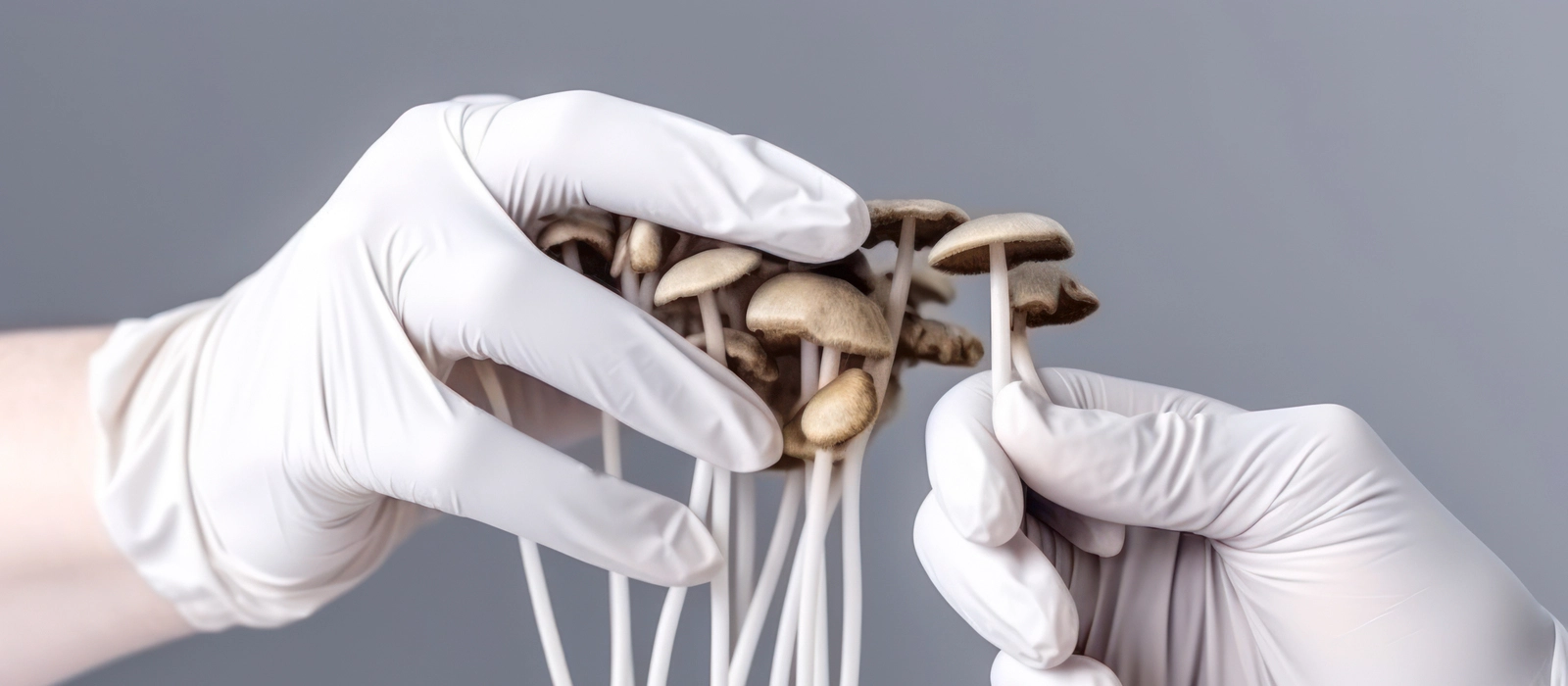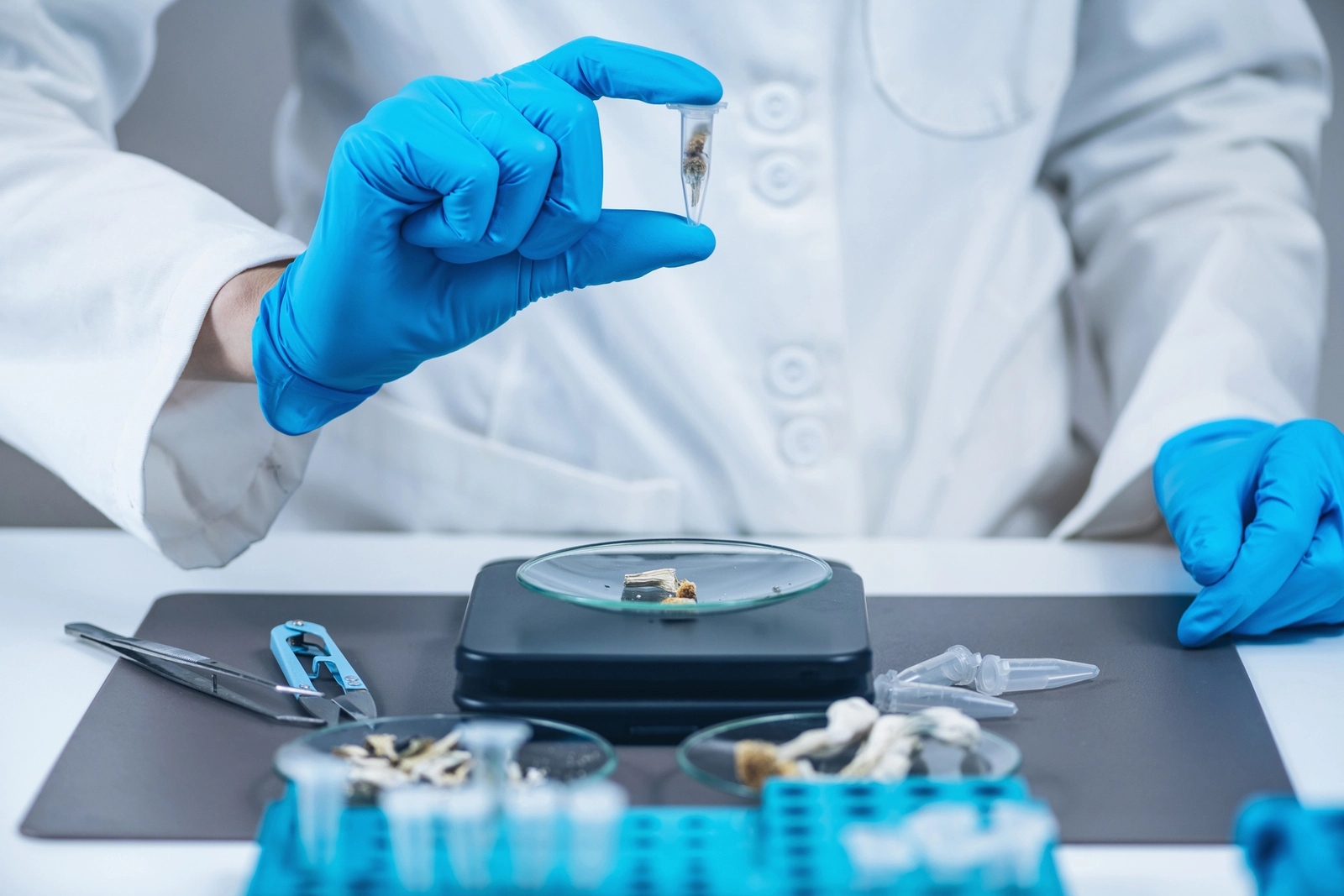Mental Health | 3 min read
SSRIs and Mushrooms: The Facts About Mixing Shrooms and Antidepressants
Medically Reviewed By

On July 15, 2025
Written By
On July 15, 2025

What you will learn
- Psilocybin mushrooms are being researched for their therapeutic benefits in treating depression, post-traumatic stress disorder (PTSD), and anxiety.
- SSRIs are one of the most commonly prescribed types of antidepressants.
- Someone on SSRIs may not experience the full therapeutic benefits of mushrooms if they’re experiencing emotional numbness.
- More research is needed on the effects of combining SSRIs and mushrooms.
In recent years, the conversation around psychedelics has shifted. Psilocybin mushrooms, or “shrooms,” were once dismissed as purely recreational or even dangerous, but they’re now being researched for their therapeutic benefits in treating depression, post-traumatic stress disorder (PTSD), and anxiety.
However, many people already use selective serotonin reuptake inhibitors (SSRIs) like Zoloft (sertraline) to manage similar mental health conditions. But is it safe to take mushrooms and antidepressants together? Here’s what we know about interactions between SSRIs and mushrooms and what precautions you should take.
What Are SSRIs?
SSRIs are one of the most commonly prescribed types of antidepressants. They include:[1]
- Zoloft (sertraline)
- Prozac (fluoxetine)
- Lexapro (escitalopram)
- Paxil (paroxetine)
- Celexa (citalopram)
These medications work by blocking the reabsorption of serotonin in the brain. This neurotransmitter is associated with emotional regulation, mood, and feelings of well-being.[2] If there’s more serotonin available in the brain, it can help reduce symptoms of depression and anxiety.
However, because SSRIs already affect serotonin levels, combining them with other substances that also interact with serotonin can be dangerous.
What Are Magic Mushrooms?
Magic mushrooms contain psilocybin, a naturally occurring psychedelic compound. Once ingested, psilocybin is converted to psilocin, which binds to serotonin receptors in the brain, particularly the 5-HT2A receptor. This causes the hallucinogenic effects of psilocybin associated with shrooms, such as enhanced perception and introspection, visual distortions, and spiritual or mystical experiences.[3]
Recent clinical trials have shown that psilocybin may have potential for helping treatment-resistant depression, anxiety, and even co-occurring addiction, often with long-lasting effects after just a few sessions.[4] However, this should not be tested without medical oversight.
Interactions with SSRIs and Mushrooms
Combining SSRIs and mushrooms is complicated and needs more research. Most research on psilocybin is focused on participants who discontinued antidepressants before the psychedelic sessions.
This is often done because participants have reported that the psychedelic effects of the mushrooms are reduced or absent when they take antidepressants. SSRIs may inhibit the action of psilocybin, likely because both act on serotonin receptors.[5] As a result, SSRIs may be discontinued to avoid any interference and ensure accurate results.
Similarly, psychedelic therapy often involves confronting and processing intense emotions. SSRIs can blunt emotional extremes, so someone on SSRIs may not experience the full therapeutic benefits of mushrooms if they’re experiencing emotional numbness.
There’s also a potential risk of serotonin syndrome, a life-threatening condition caused by too much serotonin in the brain. Serotonin syndrome can have intense symptoms like agitation, rapid heart rate, muscle rigidity, high fever, and, in severe cases, seizures. While rare and unproven in the case of the interaction, there’s a theoretical possibility that combining two substances that affect serotonin – antidepressants and psilocybin – can increase the risk of serotonin syndrome.[6]
Is It Safe to Combine Mushrooms and Antidepressants?
There’s no definitive answer. We still need more research to understand the possible interactions between psilocybin mushrooms and antidepressants. Most clinical studies exclude participants taking antidepressants.
However, some research has explored this topic. A 2022 observational study suggested that SSRIs may blunt the intensity of a psychedelic trip, but they don’t necessarily eliminate all positive psychological effects.[7] This shows promise for future research that allows both SSRIs and mushrooms to be tested together.
Precautions to Take with Antidepressants and Mushrooms
Without more understanding of the possible interactions, it’s best to take precautions with these substances:
- Do not combine mushrooms and antidepressants without medical supervision.
- If you’re interested in psychedelic therapy and are currently on SSRIs, speak to your doctor about your options.
- Never stop taking antidepressants abruptly to use psilocybin. Sudden withdrawal from SSRIs can lead to serious side effects like dizziness, nausea, insomnia, and worsening depression or anxiety.
Are There Alternatives to Antidepressants?
If you’re currently taking SSRIs like Zoloft or Prozac and want to try psilocybin therapy, you still have options.
While anecdotal reports suggest that some people experience benefits from microdosing psilocybin while on SSRIs, there is no clinical evidence supporting the safety or efficacy of this practice, and pharmacological theory suggests that SSRIs may diminish or block the effects of psilocybin.[8]
Another option is tapering off SSRIs before psychedelic therapy. In clinical settings, participants can work with a medical professional to taper off SSRIs before undergoing psilocybin therapy. Do not try to taper your dose yourself, as withdrawal symptoms may occur.
Be Careful with Shrooms and Antidepressants
The interaction between shrooms and antidepressants isn’t established or well understood. Combining psilocybin and SSRIs may be safe, but it could also have reduced effects, unpredictable reactions, or possible health risks.
If you’re currently taking antidepressants and want to try mushrooms for therapeutic or recreational purposes, it’s essential to discuss it with your doctor to ensure it’s a safe option for you and to understand the potential risks.
Frequently Asked Questions About Mushrooms and Antidepressants
There is limited research on microdosing mushrooms and antidepressants together. Anecdotal reports suggest that some people feel subtle improvements in mood while microdosing psilocybin on SSRIs, but others report no effect. Be sure to consult your doctor before combining these two substances.
While some research shows psilocybin may help with depression, mushrooms are not a direct substitute for antidepressants. Psilocybin therapy remains investigational in most jurisdictions and is only legally available through approved clinical trials or regulated therapeutic programs (e.g., in Oregon and parts of Canada). If you’re considering switching treatments, consult with your doctor to discuss your options.
Many people report that taking antidepressants like Zoloft and shrooms leads to a dampened or nonexistent psychedelic experience. This is likely because both substances interact with serotonin receptors, so SSRI antidepressant effects may interfere with psilocybin’s effects. It’s also possible that combining the two may contribute to serotonin syndrome.
Several randomized controlled trials, including Phase II studies, have demonstrated that psilocybin can produce significant reductions in depression symptoms compared to placebo or conventional treatments, though more large-scale Phase III trials are ongoing.[8] Talk to your mental health provider about the best option for you.
Ascendant New York Editorial Guidelines
Here at Ascendant New York, we understand the importance of having access to accurate medical information you can trust, especially when you or a loved one is suffering from addiction. Find out more on our policy.
[1] Mayo Foundation for Medical Education and Research. (2022, September 23). Antidepressants: Selecting one that’s right for you. Mayo Clinic. https://www.mayoclinic.org/diseases-conditions/depression/in-depth/antidepressants/art-20046273
[2] Mayo Foundation for Medical Education and Research. (2022a, September 23). Antidepressants: Selecting one that’s right for you. Mayo Clinic. https://www.mayoclinic.org/diseases-conditions/depression/in-depth/antidepressants/art-20046273
[3] U.S. Department of Health and Human Services. (2024a, October 15). Psilocybin (magic mushrooms). National Institutes of Health. https://nida.nih.gov/research-topics/psilocybin-magic-mushrooms
[4] Borissova, A., & Rucker, J. J. (2024, February). The development of psilocybin therapy for treatment-resistant depression: An update. BJPsych bulletin. https://pmc.ncbi.nlm.nih.gov/articles/PMC10801413/
[5] Gukasyan N;Griffiths RR;Yaden DB;Antoine DG;Nayak SM; (n.d.). Attenuation of psilocybin mushroom effects during and after SSRI/SNRI antidepressant use. Journal of psychopharmacology (Oxford, England). https://pubmed.ncbi.nlm.nih.gov/37291890/
[6] Candidate, M. Sc. C. BahiPharm. D. (n.d.). M.Sc. Camile Bahi. MIND Foundation. https://www.mind-foundation.org/blog/psychedelic-antidepressant-interactions
[7] Barbut Siva, J., Barba, T., Kettner, H., Kuc, J., Nutt, D. J., Carhart-Harris, R., & Erritzoe, D. (2024, February). Interactions between classic psychedelics and serotonergic antidepressants: Effects on the acute psychedelic subjective experience, well-being and depressive symptoms from a prospective survey study. Journal of psychopharmacology (Oxford, England). https://pmc.ncbi.nlm.nih.gov/articles/PMC10863370/




